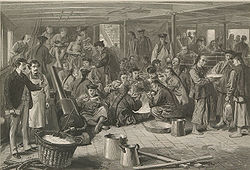- Mass migration
-
This article is about mass migration. For human migration in general, see Human migration.
Mass migration refers to the migration of a large group of people from one geographical area to another. Mass migration is distinguished from individual or small scale migration; it is also different from seasonal migration, which occurs on a regular basis.
A specific mass migration that is seen as especially influential to the course of history may be referred to as a 'great migration'. Examples of great migrations include the Barbarian Invasions during the Roman Empire, the Great Migration from England of the 1630s, the California Gold Rush from 1848–1850, and the Great Migration of African Americans from the rural American south to the industrial north during 1920–1950.
Historians often identify an 'age of mass migration', occurring from c. 1850 to 1914 (sometimes 1940), in which long distance migration occurred at an unprecedented and exceptionally high rate. There were three factors that led to the 'age of mass migration'. First, cost of migration decreased dramatically. Second, benefits of migration rise (returns on migration was higher in the US than in other countries). Third, open border regime. 'Age of mass migration' usually refers to the voluntary transatlantic migration of European peasants and labourers to the Americas. Immigration from Europe accounted for about 40% of total U.S. population growth in late 19th century. However, it has been argued that the term should include other mass migrations that occurred in the same period, since similar large numbers of people migrated long distances within the continent of Asia, most notably during the Pakistan Movement. During open border regime, immigrants attracted by falling costs of migration and higher wages in the U.S. Migrant selection varies over time and across sending country, depending on relative wage premium in U.S. for high/low skilled and cost of migration. In late 20th century, migrants converge upon native-born in labor market but never fully catch up. [1][2]
Mass migration is not always voluntary, sometimes including forced migration, such as the Atlantic slave trade.Religious persecution mass migrations,such as the biblical Exodus and migration through the upper Himalyan route from the east by Purohits of Aryan and non- Aryan descent. Similarly, mass migrations may take place in the form of deportation; for example, Japanese internment in the United States and imprisonment in Nazi concentration camps during World War II, deportations to Gulag camps in the Soviet Union, and coolie-labour in Southeast Asia and the Caribbean.
See also
- Human migration
- Great Migration (disambiguation)
- Transatlantic migrations
- Mass Migration (Band)
- Urbanization in China
References
- ^ 3k. Separation: India and Pakistan [Beyond Books - Culture and Geography]
- ^ Adam McKeown, 'Global migrations 1846-1940' in Journal of Global History
Categories:
Wikimedia Foundation. 2010.

